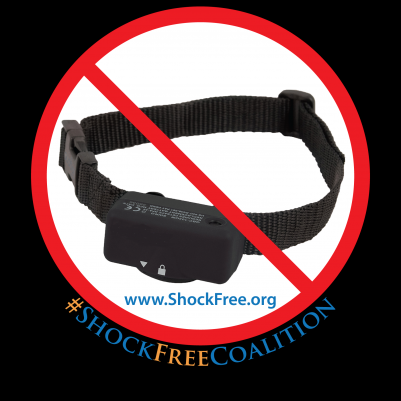Ban aligns with the key goal of the guild’s Shock-Free Coalition campaign.

Shock Free Coalition
INVERNESS, Fla. – May 4, 2023 – PRLog — The Pet Professional Guild (PPG) extends it congratulations to The Kennel Club, based in the United Kingdom, on its successful campaign to ban the use of remote-controlled electric collars on dogs in England. The ban represents the culmination of a decade-long effort by The Kennel Club.
In an April 28 announcement on The Kennel Club website (https://www.thekennelclub.org.uk/
“Fantastic news for the force-free training community and all dogs in England,” said Dayle Pierce of PPG’s British Isles Chapter. Added Nathan Watson, also of PPG’s British Isles Chapter, “The news that shock collars are to finally be banned in England, quite honestly, is a huge relief! In the past year or so, I have seen them being used increasingly frequently by trainers on social media, and also local dog owners as they follow the social media shock-collar marketing. There are even local trainers now using them, which further fuels the problem. I firmly believe there is no place for the use of pain or fear in dog training. February 1, 2024, cannot come soon enough—it will certainly be a day for celebration!
PPG launched its own global advocacy campaign, the Shock-Free Coalition, to end the practice of using electric shock to train, manage, and care for pets in 2017. The Shock-Free Coalition hosts a Shock-Free Pledge on its website (www.shockfree.org) for supporters to sign, as well as a variety of educational tools and resources to help pet professionals promote the movement and encourage participation across their communities. Global leaders in the animal welfare, veterinary, behavior and training worlds, including celebrity dog trainer, Victoria Stillwell; biologist, ethologist, behavioral ecologist, and writer, Dr. Marc Bekoff; and renowned author, veterinarian, and certified applied veterinary behaviorist, Dr. Karen Overall, have lent their voices to the Shock-Free Coalition.
“There is no need to harm pets in the name of management, care and training,” said PPG President and Founder Niki Tudge. “Shock collars, like any tool designed to work by inflicting pain or fear, trigger harmful psychological and physiological responses, causing pets to experience not only pain, but also fear, sadness and anxiety. When a pet feels threatened, a stress response is triggered, and the neural pathways that support dealing with danger are activated. Pets who have been physically punished tend to exhibit high hormonal reactivity to stress; overloaded biological systems, including the nervous, cardiovascular and nutritional systems; and changes in brain structure and function. Using shock on pets is inexcusable given that we, the professional community, scientists and behaviorists, know better and have other resources at hand to help support pets and their owners. We are overjoyed by this news and welcome its implementation.”
Numerous studies conducted by veterinary scientists and behavior specialists worldwide indicate that the use of pain and fear to train animals risks causing physical injury, as well as a host of psychological issues that may include a pet becoming fearful of other animals and people—and potentially aggressive toward them as a result. Although electric shock collars have been banned in some places, including Austria, Denmark, France, Germany, New South Wales, Norway, Quebec, Scotland, Slovenia, South Australia, Sweden, Switzerland, Wales, and now England, it is still legal in many others, including the United States.
About the Shock-Free Coalition
The key purpose of the Shock-Free Coalition is to build a strong and broad movement committed to eliminating shock devices from the supply and demand chain. This goal will be reached when shock tools and equipment are universally unavailable and not permitted for the training, management and care of pets. The Shock-Free Coalition believes that pets have an intrinsic right to be treated humanely, to have each of their individual needs met, and to live in a safe, enriched environment free from force, pain and fear. The initiative has been developed purposely to bring together parties that have mutual business interests and a personal investment in the welfare of pets and embraces stakeholders of similar values and interests, enabling all parties to combine their resources and become more successful in achieving the stated goals. Members of the Shock-Free Coalition consider it to be their responsibility and utmost obligation to be vigilant, to educate, to remain engaged and work toward eliminating shock as a permissible tool so it is never considered a viable option in the training, management and care of pets.
Key Pet Professional Guild Position Statements
The Use of Shock in Animal Training: http://petprofessionalguild.com/
The Use of Remote Electric Shock: http://petprofessionalguild.com/
The Use of Pet Correction Devices: http://petprofessionalguild.com/
